
The Monkey King is a fictional character best known as one of the main players in the 16th-century Chinese novel Journey to the West, and many later stories and adaptations. In the novel, Sun Wukong is a monkey born from a stone who acquires supernatural powers through Taoist practices. After rebelling against heaven, he is imprisoned under a mountain by the Buddha. After five hundred years, he accompanies the monk Tang Sanzang (唐三藏) riding on the White Dragon Horse and two other disciples, Zhu Bajie and Sha Wujing, on a journey to obtain Buddhist sutras from the West (India), where Buddha and his followers dwell.

Journey to the West is a Chinese novel published in the 16th century during the Ming dynasty and attributed to Wu Cheng'en. It is regarded as one of the greatest Classic Chinese Novels, and has been described as arguably the most popular literary work in East Asia. Arthur Waley's 1942 abridged translation, Monkey, is known in English-speaking countries.
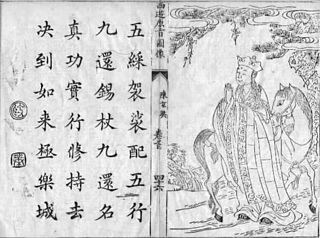
Tang Sanzang is a Buddhist monk and pilgrim who is a central character in the 16th century novel Journey to the West by Wu Cheng'en. Tang Sanzang is based on the historical Tang dynasty monk Xuanzang.

Zhu Bajie (Chinese: 豬八戒; pinyin: Zhū Bājiè; Wade–Giles: Chu1 Pa1-chieh4), also named Zhu Wuneng (he has two Buddhist Dharma names, one, "Wuneng" (悟能) given to him by the bodhisattva, Guanyin, and one, "Bajie" (八戒) given to him by Tang Sanzang/Tripiṭaka), is one of the three helpers of the aforementioned-Tang Sanzang and a major character of the 16th century novel Journey to the West. Zhu means "swine" and Bajie means "eight precepts". Prior to his being recruited by the bodhisattva, Guanyin, Zhu Bajie went by "Zhu Ganglie" (literally "Strong-Maned Pig"). Buddhist scholars consider that both expressions are related to "Śīla pāramitā". In many English versions of the story, Zhu Bajie is called "Monk Pig", "Pig", "Piggy", or "Pigsy".
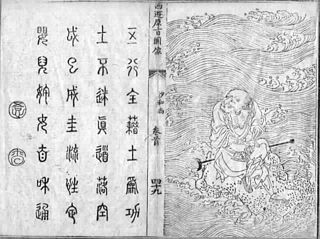
Sha Wujing is one of the three disciples of the Buddhist pilgrim Tang Sanzang in the 16th century novel Journey to the West written by Wu Cheng'en in the Ming dynasty, although versions of his character predate the Ming novel. In the source novel, his background is the least developed of the pilgrims, and he contributes the least to their efforts.

Journey to the West is a Chinese television series adapted from the classic 16th-century novel of the same title. The first 11 episodes of the series were first broadcast on CCTV in China on 1 October 1986. The series became an instant classic in China and was praised for being one of the most original and faithful interpretations. The series was budgeted for 30 episodes, due to budgetairy reasons 5 of the planned episodes were left out. The screenplay for the left out 5 episodes was rewritten and some more portions of the original novel were later covered in the second season, which was released in 1999. CCTV released the entire series online on YouTube as an edited version with English subtitles. The second season starts in the edited version with the capture of the Tang Monk. After that the edited version follows the original order. However, episode 5 Meeting immortals at Peacock Platform of the second season was deleted and parts of the content were integrated into the fourth episode Obstacle at Lion Camel Ridge making a total of 40 episodes instead of the original 41.

The Monkey King, also known as The Lost Empire, is a 2001 television miniseries produced by NBC and the SciFi Channel. It is a contemporary take on the classic 16th-century novel Journey to the West. It stars Bai Ling, Thomas Gibson, Russell Wong, Eddie Marsan, and Randall Duk Kim. The miniseries was directed by Peter MacDonald and written by Asian American dramatist David Henry Hwang.

Baigujing is a demon from the 16th century novel Journey to the West. The name is translated into English as White Bone Spirit in the William John Francis Jenner translation. Baigujing is a shapeshifting demoness, and in her true form she is depicted as a skeleton.

A Chinese Tall Story is a 2005 Hong Kong fantasy adventure film written and directed by Jeffrey Lau. The story is loosely based on the 16th-century novel Journey to the West.
Gao Village a minor village featured within the shenmo fantasy novel Journey to the West, a Chinese literary classic written in the Ming dynasty. Gao Village is a village that remains rather near to the main Tang dynasty - thus being within China. Around chapter 18, Tang Sanzang and Sun Wukong would arrive at this seemingly small village. Gao Village is run by an old man named Mr. Gao and his hard working villagers, including his wife and 3 daughters(One of them is Gao Cuilan who was once a partner of Zhu Bajie. This village is reputed for its amount of vegetarian food - as seen with Zhu Bajie, Squire Gao's son-in-law. After Bajie is effectively subdued by Wukong due to his exceedingly gluttonous and lustful ways, this village's overall provisional production rises to a large margin. Sanzang, Wukong, and his new disciple all soon leave this village and continue their journey westward. This village would not be shown again following Bajie's subjugation during chapter 19.
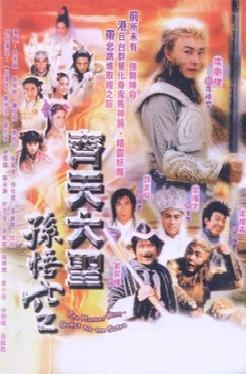
The Monkey King: Quest for the Sutra is a 2002 Hong Kong TV series based on the 16th-century novel Journey to the West. It is also a remake of the 1996 TVB version.
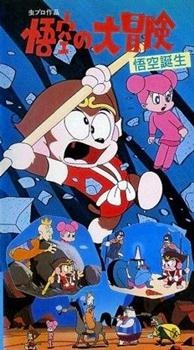
Gokū no Daibōken is a Japanese anime series that was directed by Gisaburō Sugii. Made by Mushi Productions, the anime's 39 episodes were broadcast on Fuji TV between January 7, 1967, and September 30, 1967. The anime is based on the 16th-century novel Journey to the West.

Journey to the West: Legends of the Monkey King is a 1998 animated series produced by China Central Television and the CINAR Corporation. It is based on the 16th-century novel Journey to the West. There are 26 episodes in total, with a duration of about 22 minutes each, along with a 75-minute prequel television film. In the Original 1998 Chinese edition of the series, there are instead 52 episodes with each segment being extended to a full half hour episode with added animation and dialogue, and the prequels making up episodes 1-7.
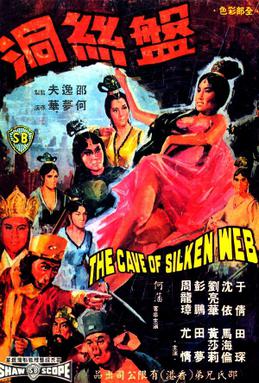
The Cave of the Silken Web is a 1967 film directed by Ho Meng Hua and produced by Shaw Brothers Studio in Hong Kong. The film is based on an episode from the 16th-century classic Chinese novel Journey to the West.

Journey to the West: Conquering the Demons is a 2013 fantasy comedy film co-written and produced by Stephen Chow and co-directed by Chow and Derek Kwok. The movie was first announced in July 2011 and was released on February 10, 2013 in China. The film is a loose comedic re-interpretation of the 16th-century novel Journey to the West, a Chinese literary classic often believed to be written by Wu Cheng'en.
Wu Cheng'en and Journey to the West is a Chinese television series about the life of Wu Cheng'en and his inspiration for writing the 16th-century novel Journey to the West. The series was directed by Kan Weiping and consists of a total of 45 episodes shot in high definition, each 45 minutes long and containing 10 minutes of 3-D effects. The original lead actors of the 1986 television series Journey to the West starred in Wu Cheng'en and Journey to the West and reprised their roles: Liu Xiao Ling Tong as Sun Wukong, Chi Chongrui as Tang Sanzang and Ma Dehua as Zhu Bajie. Sha Wujing, however, was portrayed by Liu Dagang because the original actor, Yan Huaili, died in April 2009. It was broadcast by Shandong Qilu TV in July 2010.

The White Dragon Horse, known as Bai Long Ma, and Yu Long, in Chinese, is one of the main characters in the 16th-century Chinese novel Journey to the West. He is Tang Sanzang's steed who later became Babu Tianlong Guangli Bodhisattva (八部天龙广力菩萨) at the end of novel.

The Monkey King 2 is a 2016 Hong Kong-Chinese action fantasy film based on the classic 16th-century novel Journey to the West by Wu Cheng'en. The film was shot in 3D and is a sequel to the 2014 box office hit The Monkey King with Cheang Pou-soi returning as director and Sammo Hung as action director, who replaces Donnie Yen's role from the previous installment. The film stars Aaron Kwok, who portrayed the main antagonist in the previous installment, as the film's titular protagonist, who also replaces Yen from the previous installment. It was released in the United States on 5 February, in Hong Kong on 6 February and in China on 8 February 2016. A sequel, The Monkey King 3, was released in China in 2018.

Journey to the West: The Demons Strike Back is a 2017 Chinese fantasy adventure comedy film directed by Tsui Hark. A sequel to Stephen Chow's 2013 film Journey to the West: Conquering the Demons, it was produced and co-written by both Tsui and Chow.

















